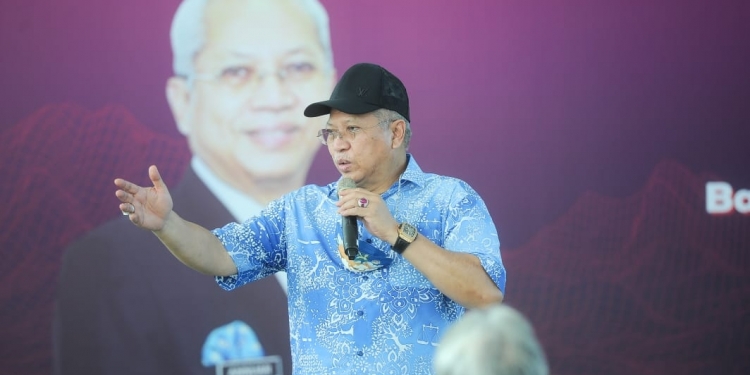Communications and Multimedia Minister (MenKomm) Tan Sri Annuar Musa said 1,000 schools throughout Malaysia including rural areas are expected to be provided with 5G network by the end of 2022. The initiative aims not only to help the school management through a better learning process but also to benefit consumers in the surrounding area.
As reported by Bernama during his visit to Ketereh Market yesterday, the minister said “We are still waiting for the green light from the Education Ministry, and I have already discussed with the Malaysian Communications and Multimedia Commission (MCMC) and Digital Nasional Berhad (DNB), who have given their commitment to make a success of the 5G network implementation in schools.”
He added that his ministry has decided to select five or six schools to test the capacity of the 5G network.
There isn’t much information at the moment and there’s a possibility that the initiative could be similar to 1BestariNet which was meant to provide 10,000 schools with 4G connectivity. At the moment, YTL Communications via Yes 5G remain the only telco in Malaysia to provide 5G services through DNB. According to DNB’s 5G coverage roadmap, it aims to achieve 40% population coverage by the end of this year covering the Klang Valley, Penang, Johor, Sabah, Sarawak, Negeri Sembilan and Perak.
Malaysia’s 5G mass rollout is still up in the air
Despite media reports that all major telcos are on board with DNB, the mass 5G rollout still remains up in the air as the government missed its 8th July date to make an official announcement on the sale of DNB’s 70% stake to six telcos. Annuar Musa also expects the telcos to complete their due diligence for the equity stake in just two months and 5G services will be widely available by September.
As of last week, no major telco has signed the Reference Access Offer (RAO). According to our sources the big four telcos such as Celcom, Digi, Maxis and U Mobile have merely submitted the Access Request Application Form and signed a non-binding term sheet for the equity deal.
What happened to 1BestariNet?
In 2011, YTL Communications was awarded the 1BestariNet project to provide internet connectivity to 10,000 schools and access to the Frog Virtual Learning Environment (VLE) platform. In July 2019, the Ministry of Education under the Pakatan Harapan administration didn’t extend the contract with YTL Communications. Instead, they appointed Telekom Malaysia, Celcom and Maxis to provide connectivity to schools.
Initially, YTL claims that the Ministry of Education had breached the 1BestariNet contract but the allegation was later refuted by the Ministry’s secretary general Datuk Dr Mohd Gazali Abas. According to YTL, the Ministry had planned to call for a fresh tender in 2019 to continue to provide internet connectivity to 10,000 schools. The statement issued by YTL said during a meeting involving several telcos including Telekom Malaysia, Celcom Axiata, Maxis and YTL Communications, the Ministry said it wasn’t ready for a tender to be implemented on 1st July 2019 when phase 2 of the contract with YTL Communications would expire.
YTL said that the Ministry had requested them to provide free internet as the government didn’t have budget to pay for these services. Not wanting to disrupt the virtual learning platform, YTL agreed to provide a complete solution of free internet services along with Frog VLE during the interim period until a fresh tender was called and awarded. YTL said it was surprised when the government had reneged on its statement to call for an open tender and they agreed to pay for the internet services to the three other telcos despite YTL offering it for free.
The Ministry of Education later responded with five reasons why they rejected YTL’s offer. The first reason is hidden cost as it claimed that YTL has never paid for electricity to power the towers that were built in schools and government premises. It claimed that the government had to foot the electricy bill worth RM41.88 million for 2,715 sites. Other reasons include potential loss in revenue from site rental and that the project had several weaknesses when it comes to implementation. The Ministry also alleged that the project was not able to explore the latest and appropriate technology and they found that the quality of the internet provided was not satisfactory.
On a separate matter, there’s still no update on the PerantiSiswa programme which was meant to distribute tablets to B40 students. Towards the end of May, Annuar Musa said the tender for the initial tablet supplier was cancelled by the Ministry of Finance and he hopes that they will make a decision by mid-June. The first batch of tablets was supposed to be distributed starting last month.
[ SOURCE, IMAGE SOURCE ]
Related reading
- Annuar Musa expects telcos to conduct due diligence for DNB equity deal in two months, 5G services available by September
- Annuar Musa: Sale of DNB’s 70% equity stake to six telcos to be finalised by 8th July
- Annuar Musa says UMNO Youth misinformed about Malaysia’s 5G development, will hold special briefing this Friday
- PerantiSiswa rollout faces delays as Finance Ministry cancels tender of initial tablet supplier








